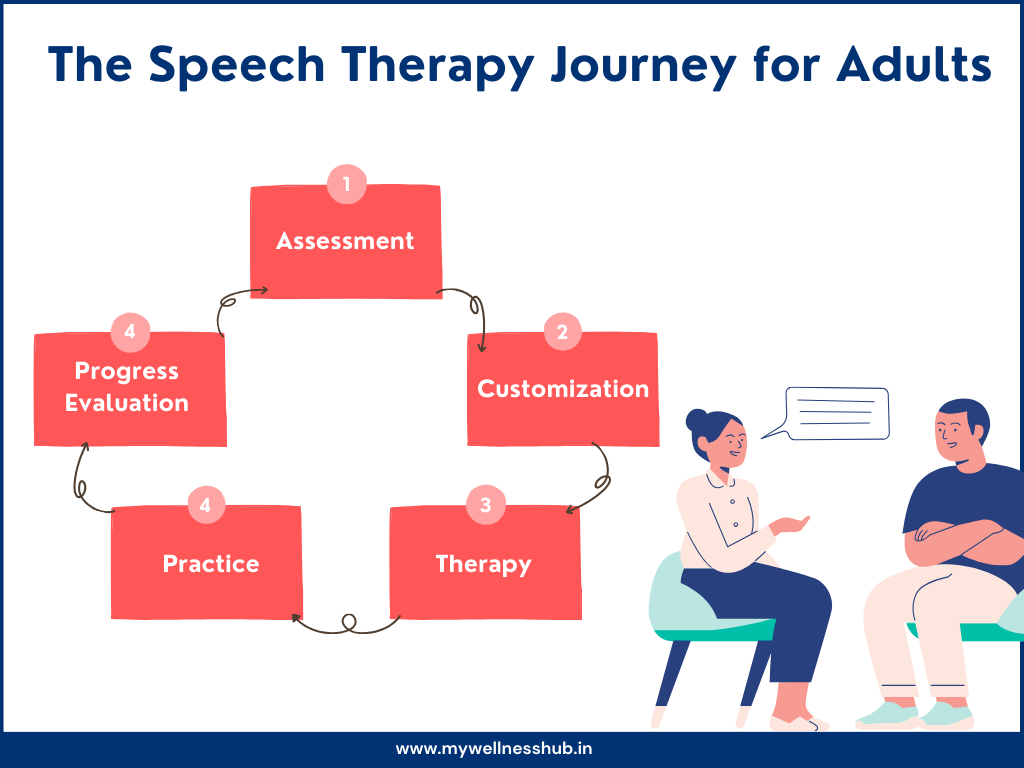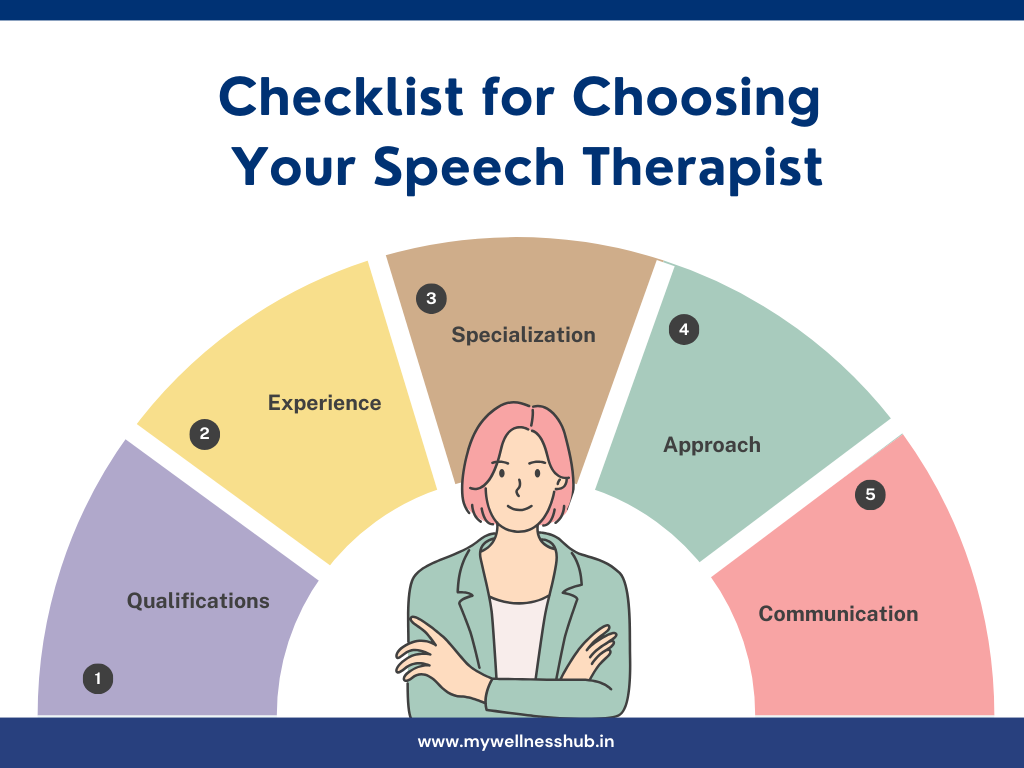6 Reasons an Adult Would Need A Speech Therapist
By Rajini D
Last Updated: April 17, 2024
Speech therapy isn’t just for children; it’s crucial for adults facing communication challenges from medical conditions, injuries, or age-related changes. Adult speech therapy helps regain speech functions, enhance social interactions, and maintain independence. Through personalized strategies, speech therapists assist adults in improving both their speaking abilities and overall quality of life. This brief overview sets the stage for exploring the diverse benefits and applications of speech therapy in adult care.
In this article, we’ll explore six key reasons why adults might seek out speech therapy. You’ll see how this practice doesn’t just help with speech—it empowers people to express themselves, connect with others, and improve their overall quality of life.

Understanding Speech Therapy for Adults
Adult speech therapy isn’t just about speaking more clearly; it’s a way to help adults communicate confidently and effectively. It covers a wide range of needs, from managing speech difficulties and regaining language skills after a stroke to improving voice tone and fluency for smoother conversations at work or with friends.
Every person’s therapy plan is unique, tailored to their specific needs and goals. For instance, someone might want to stop stuttering, while another may need help rebuilding speech skills after an injury. Each case is approached with personalized exercises and strategies.
Consider Anna, a teacher who had trouble speaking clearly after a stroke. Through speech therapy, she practiced skills that helped her return to the classroom with confidence. Therapy, for Anna, wasn’t just about talking—it was about getting back to her life.
Read Also: Improve Speech at Home: Adult Speech Therapy Made Easy
6. Reasons Adults Need Speech Therapy
Building on what we know about adult speech therapy, let’s look at six core reasons why adults might seek this valuable support. Each reason touches on important aspects of communication that many of us might take for granted.
1. Dysphasia and Swallowing Issues
- Glottal Stop Technique: Used in speech therapy to help manage airflow and pressure, improving speech clarity.
- Understanding Dysphasia: Dysphasia affects an individual’s ability to communicate and swallow, often resulting from neurological disorders or brain damage such as strokes. It impacts daily interactions and the ease of mealtime.
- Causes of Swallowing Difficulties: Commonly linked to neurological conditions, cancer, and muscular diseases, these issues can complicate eating and increase risks like choking.
- Diagnostic Process: The evaluation for swallowing issues includes a videofluoroscopic swallow study, where patients consume barium-coated food and liquids. This X-ray technology allows therapists to observe and analyze the swallowing mechanism.
- Role of Speech Therapy: Speech therapists utilize exercises to strengthen mouth and throat muscles, improving both speech and swallowing abilities.
- Oral-Motor Workouts: These exercises enhance muscle coordination and strength, crucial for effective swallowing.
Also read: Understanding Language Disorders: Causes and Characteristics
2. Understanding Stuttering: Impact and Management
- What is Stuttering? Stuttering is a speech disorder characterized by repetitions, prolongations, or blocks that disrupt the normal flow of speech. This condition can significantly affect an adult’s ability to communicate effectively and can lead to frustration and decreased self-esteem.
- Emotional Triggers and Psychological Impact: Stuttering often worsens in stressful situations or under emotional pressure, leading to anxiety and self-consciousness. For many adults, these feelings can hinder professional performance and social interactions, impacting overall mental health and quality of life.
- Speech Therapy Techniques for Stuttering:
- Situational Practices: Speech therapists work with individuals to identify specific situations that trigger stuttering. Techniques such as role-playing or simulated conversations can help adults prepare and reduce anxiety in those contexts.
- Long-term Strategies: These include regular practice of speech exercises, such as controlled breathing and pacing techniques, which help manage the rhythm and speed of speech. Over time, these strategies can improve fluency and reduce the occurrence of stuttering episodes.
3. Addressing Acquired Apraxia: Strategies and Support
- Technology Aids: Advanced tools and apps may be used to provide visual and auditory feedback, helping patients adjust their speech in real-time.
- What is Acquired Apraxia? This speech disorder occurs in adults following a brain injury or disease. It impairs the brain’s ability to manage the muscle movements necessary for speech, making it challenging for individuals to say what they intend.
- Speech Challenges: Adults with apraxia may struggle with initiating speech, making inconsistent mistakes, and substituting sounds, which can make communication frustrating.
Effective Therapies:
- Customized Therapy Plans: At Wellness Hub, each therapy plan is tailored to the individual’s specific needs, focusing on exercises that improve speech precision and coordination.
- Practice and Repetition: Therapists use drills to help patients practice sounds, words, and sentences to improve clarity and articulation.
4. Understanding Dysarthria: Impact and Management Strategies
- Adaptive Strategies: Teaching patients adaptive strategies to communicate more effectively, despite the physical limitations posed by dysarthria.
- What is Dysarthria? Dysarthria is a motor speech disorder where weakened or impaired muscle control affects speech. It is typically caused by neurological conditions, such as stroke, brain injury, or diseases that affect the nervous system like Parkinson’s disease or multiple sclerosis.
- Challenges of Dysarthria: Adults with dysarthria often experience slurred, slow, and difficult-to-understand speech. The disorder can lead to frustration and social isolation due to challenges in expressing oneself clearly. Physical symptoms may include weak voice, uneven speech volume, and rapid, mumbling speech that is hard to decipher.
Speech Therapy Interventions:
- Articulation Exercises: Speech therapists at Wellness Hub use specific exercises to strengthen the muscles used in speech, improving clarity and articulation.
- Breath Support Techniques: Enhancing breath control to provide a stronger, more stable voice, which is crucial for clear speech.
5. Navigating Aphasia: Challenges and Speech Therapy Techniques
- Supportive Communication Environment: Creating a supportive environment is crucial, encouraging patients to express themselves at their own pace and using alternative communication methods as needed.
- Understanding Aphasia: Aphasia is a communication disorder that results from damage to the parts of the brain responsible for language. Most commonly caused by strokes, aphasia can lead to significant challenges in speaking, reading, writing, and understanding speech.
Types and Symptoms of Aphasia:
- Expressive Aphasia: Individuals know what they want to say but struggle to communicate it effectively. Symptoms include speaking in short or incomplete sentences and omitting words.
- Receptive Aphasia: This type makes it difficult to understand others or even read. People with receptive aphasia may speak in long, complex sentences that make little sense or include unneeded or invented words.
- Global Aphasia: The most severe form, combining significant impairments in speaking, understanding speech, reading, and writing.
Speech Therapy for Aphasia:
- Personalized Communication Strategies: At Wellness Hub, speech therapists develop personalized plans that cater to the specific type of aphasia. Techniques may include using pictures, gestures, or technology to improve communication.
- Language Retraining Exercises: These involve repetitive activities and drills to help regain language processing skills and rebuild the ability to form coherent speech and understand verbal and written cues.
6. Addressing Age-Related Changes
- As we age, natural changes in speech and language can make communication a bit harder. Speech therapy provides techniques to maintain strength, clarity, and confidence in speaking, allowing adults to stay active in conversations and stay connected with others.
- Example: Michael, noticing that his voice was softer and less clear, found speech therapy helpful for maintaining vocal strength and clarity, which allowed him to keep up with family discussions.
Comparing Speech Therapy Methods
| Method Name | Description | Conditions It Helps | Typical Duration |
|---|---|---|---|
| Articulation Therapy | Focuses on improving clarity by practicing sounds, syllables, and words. | Stuttering, Apraxia, Dysarthria | 6 months – 1 year |
| Language Intervention | Enhances understanding and use of language through activities and exercises. | Aphasia, Age-Related Changes | Varies based on progress |
| Breath Control Exercises | Teaches techniques for better voice control and speech production. | Dysarthria, Voice Disorders | 3 – 6 months |
| Fluency Shaping | Aims to modify speech patterns to produce fluent speech. | Stuttering | 6 months – 1 year |
| Cognitive-Communication Rehabilitation | Focuses on improving cognitive aspects of communication, such as attention, memory, and problem-solving. | Post-stroke, Traumatic Brain Injury (TBI) | Varies based on individual needs |
| Voice Therapy | Involves exercises to improve vocal quality and reduce strain. | Voice Disorders, Dysarthria | 3 – 6 months |
| Swallowing Therapy | Utilizes exercises to strengthen muscles and improve swallowing function. | Dysphagia, Post-stroke | 3 – 6 months |
Finding the Right Speech Therapist

Choosing the right speech therapist can make a big difference in your progress. Here’s what to look for:
How to Choose the Right Speech Therapist
Finding the right speech therapist is crucial for a successful therapy experience. Here’s a straightforward guide to help you make the best choice:
1. Check Qualifications
- Ensure the therapist has the necessary credentials, like a Master’s degree in Speech-Language Pathology and certification from a reputable board such as the American Speech-Language-Hearing Association (ASHA).
2. Consider Experience
- Look for a therapist with experience relevant to your specific needs, whether it’s stuttering, aphasia, or another condition.
3. Focus on Specialization
- Choose a therapist who specializes in your area of concern. Specializations can range from pediatric issues to adult rehabilitation.
4. Evaluate the Therapist-Client Relationship
- Comfort and understanding are key. You should feel at ease and able to communicate openly with your therapist.
5. Accessibility and Flexibility
- Check if the therapist’s location is convenient and if their schedule works with yours. Also, see if they offer online sessions, which can add flexibility to your therapy plan.
Wellness Hub’s Approach
At Wellness Hub, we provide skilled therapists with diverse specializations, flexible schedules, and options for both in-person and online sessions to fit your needs.
Conclusion
Speech therapy isn’t just for kids—it’s a game changer for adults too! Whether you’re struggling with speech clarity, recovering from a stroke, or facing age-related communication challenges, speech therapy can help. It improves your ability to connect with others and enhances your overall quality of life. Considering speech therapy? At Wellness Hub, we offer personalized support that fits your lifestyle, with both in-person and online options available. Don’t let speech challenges hold you back. Discover how our expert therapists can help you communicate better and live fully.
Frequently Asked Questions:
1. Is Speech Therapy Beneficial for Adults?
Absolutely. Adult speech therapy is designed to address various speech and communication issues, including dysphasia, stuttering, apraxia, dysarthria, aphasia, and age-related changes. It helps improve speech clarity, fluency, and overall communication skills, significantly enhancing quality of life.
2. How Can I Find the Right Speech Therapist for Adults?
Finding the right speech therapist involves looking at their qualifications, experience, and specialization in adult communication issues. It’s important to choose a therapist who uses approaches and techniques that resonate with you. Wellness Hub offers personalized speech therapy services with experienced professionals ready to support your journey toward better communication.
3. What Conditions Can Adult Speech Therapy Help With?
Adult speech therapy can assist with a range of conditions, including but not limited to dysphasia (swallowing difficulties), stuttering, acquired apraxia (a motor speech disorder), dysarthria (weak or uncontrolled speech muscles), and aphasia (language processing disorder). It can also help address speech and language challenges related to aging.
4. Can Speech Therapy Improve Professional and Social Life?
Yes, speech therapy can have a profound impact on both professional and social aspects of life. By enhancing communication skills, individuals can experience increased confidence in public speaking, clearer articulation in conversations, and improved interpersonal relationships.
5. How Does Wellness Hub Approach Adult Speech Therapy?
Wellness Hub takes a personalized approach to adult speech therapy, understanding that each individual’s needs are unique. With a team of skilled therapists, Wellness Hub offers tailored therapy plans focusing on the specific goals and challenges of each client, ensuring a supportive and effective therapy experience.
6. Are There Online Speech Therapy Options for Adults?
Yes, many providers, including Wellness Hub, offer online speech therapy sessions. This option provides flexibility and accessibility for adults who may have busy schedules or prefer the convenience of receiving therapy from their own homes.
7. How Long Does Adult Speech Therapy Typically Last?
The duration of adult speech therapy varies depending on the individual’s specific needs, the severity of their condition, and their goals. Some may see improvements within a few months, while others may engage in therapy for longer periods. A speech therapist will tailor the therapy plan to suit each person’s pace and progress.
8. Can Speech Therapy Help Adults Who Have Had a Stroke?
Yes, speech therapy is particularly beneficial for stroke survivors. Many adults experience speech and language difficulties after a stroke, such as aphasia. Speech therapy plays a crucial role in recovery, helping individuals regain their communication skills and improve their ability to understand and use language.
9. What Are the Signs That an Adult Might Need Speech Therapy?
Signs include difficulty pronouncing words, hesitating or stuttering when speaking, struggling to understand spoken language, challenges with reading and writing, and problems with swallowing. If these issues persist and impact daily life, it might be time to consult a speech therapist.
10. Is Adult Speech Therapy Covered by Insurance?
Coverage for adult speech therapy varies by insurance provider and plan. Some insurance plans cover speech therapy when deemed medically necessary, while others might have specific limitations or requirements. It’s important to check with your insurance provider for details about coverage for speech therapy services.
About the Author:
Rajini Darugupally
M.Sc., Speech-Language Pathologist (9+ years of experience)
Rajini is a passionate and dedicated Speech-Language Pathologist with over 9+ years of experience, specializing in both developmental speech and language disorders in children and rehabilitation in adults. Driven by a desire to empower each individual to find their voice, Rajini brings a wealth of experience and a warm, genuine approach to therapy.
Currently, at Wellness Hub, she thrives in a team environment that values innovation, compassion, and achieving results for their clients.
Connect with Rajini to learn more about how she can help you or your loved one find their voice.
Book your Free Consultation Today
Parent/Caregiver Info:
Client’s Details:
* Error Message









